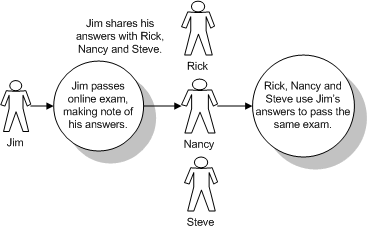Distance Learning and Test Taking
Challenge:
Online certifications are more popular on the web today than ever before. The convenience of taking an exam in the comfort of your own home is appealing not only to those taking the exams, but to those administering the exams as well. Students are getting their college degrees online. Service Technicians are taking exams to obtain certifications to enable them to repair more products. However, with this convenience comes some concern for security. Users of these online exams could share test answers with each other, degrading the integrity of the online exam. Students could "cheat" their way to degrees, and technicians could get certified to repair products that they would know nothing about. Would you feel comfortable hiring a college graduate who doesn't know anything about his field? Or having a technician come to your home with no idea of how to alleviate your problem?

Solution:
There are a few solutions that MNL can implement to take the worry out of online cheating. The more you combine each of these solutions together, the stronger your security will be to prevent this cheating from happening.
 Randomizing a subset of exam questions. Imagine coming back to an exam you have failed, and seeing an entirely different exam... When you randomize a subset of exam questions, it means taking SOME of the exam questions and jumbling their order. For example, in your database of 50 exam questions for a particular test, you only choose 25 questions to ask the user. This produces an endless number (over 126 Billion in this case) of different exams that the user could possibly take. Couple that with randomizing the order of the questions, the user will never take the same exam twice. This makes it virtually impossible for the user to pass along the answers to a friend who is looking to pass the same exam.
Randomizing a subset of exam questions. Imagine coming back to an exam you have failed, and seeing an entirely different exam... When you randomize a subset of exam questions, it means taking SOME of the exam questions and jumbling their order. For example, in your database of 50 exam questions for a particular test, you only choose 25 questions to ask the user. This produces an endless number (over 126 Billion in this case) of different exams that the user could possibly take. Couple that with randomizing the order of the questions, the user will never take the same exam twice. This makes it virtually impossible for the user to pass along the answers to a friend who is looking to pass the same exam.
- Post-exam feedback. Some online exams will give you immediate feedback after each answer. In this case, you could conceivably take the exam enough times until you knew the answer to each question. However, using post-exam feedback, you can keep the user in the dark about what questions they answered correctly, or incorrectly. For example, if a user completed a 20-question exam, and at the end there was a message saying, "You passed with an 85%. Congratulations!", they would have no idea what 3 questions they answered incorrectly. This would make it very difficult for a user to relay the exam answers to a friend.
- Limiting exam attempts. This solution stems from the previous example. If you gave the user immediate feedback after every exam question, they could conceivably obtain the answer to each question using the trial-and-error method. However, if you limited the user to taking the exam once a day, or even once a week, this could get painstaking. It would make it worth it for them to actually study for the exam! How can you tell how many times a user has taken an exam in a certain time period? Simple. Each time the user takes an exam, it gets logged. Before the user takes an exam, we can check this log to see if the user has used up his/her quota for the given time period.
As stated before, any of these solutions make it extremely difficult for users to share answers with each other. Furthermore, MNL can combine any number of these solutions together, to make an air-tight security system for your online exams.
Result:
MNL implemented a combination of all three solutions above to provide a secure online exam system for a reseller web site. Users of this web site could enter the site and take exams for certification to repair certain products. Before MNL came to the rescue, a check of the exam log showed that a single user would pass an exam, followed by numerous users from the same company passing the same exam with the exact same answers. Immediately following MNL's insertion of this exam security system, the exam log showed no signs of users sharing answers with each other. Different users were taking entirely different exams pertaining to the same product.
- Case Studies (Top Four)
- MNL Builds sophisticated Reference Management System for EMC2
EMC2 - Partner/Reseller Sales Marketing Portal
Cisco Systems - Dynamic Online Catalog
Tyco Electronics
- Athena for Sarbanes-Oxley
MAP Communications